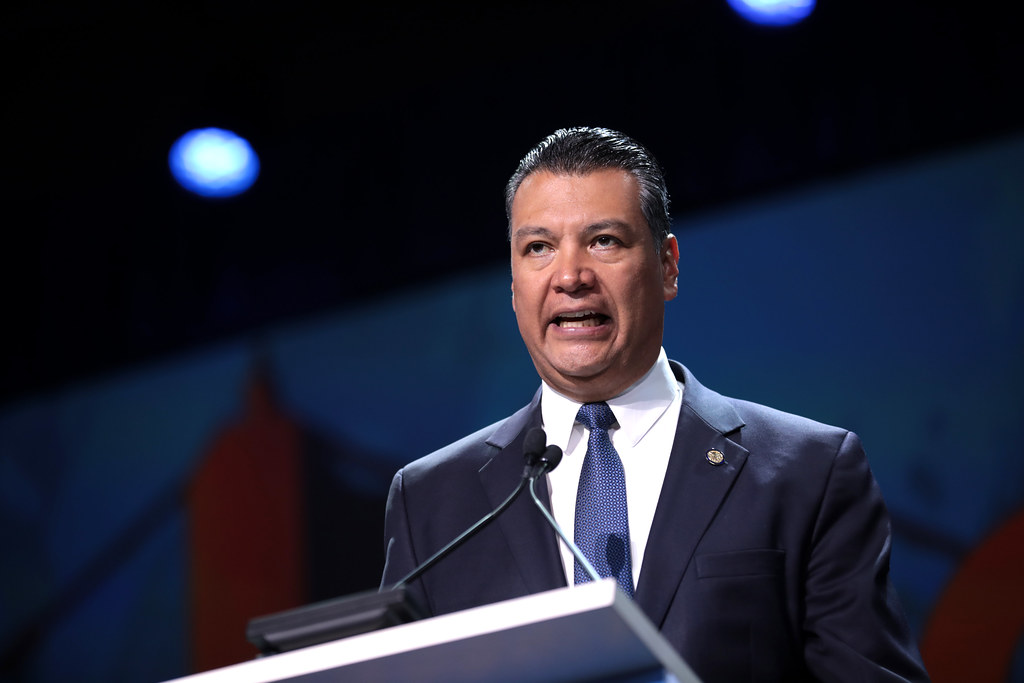
California Sen. Alex Padilla said the bipartisan $118-billion border and foreign aid bill supported by President Biden “misses the mark,” putting the Democratic senator in the unusual position of opposing a priority of the Democratic president as he campaigns for reelection.
Senator Padilla voiced his concerns about the bill, emphasizing the need to support allies in their efforts to defend democracy and provide humanitarian relief. However, he believes that this should not come at the expense of dismantling the asylum system or failing to address the challenges at the U.S. border. He made this statement on a Sunday, making it clear that he does not support the current version of the bill.
A Conservative Wish List
The bipartisan bill, amounting to a wish list of GOP immigration priorities, has been the result of months of negotiations between Democrats and Republicans. Notably, it stands out as one of the most conservative packages to receive the backing of a Democratic president in decades. Despite these conservative elements, President Biden has expressed his willingness to sign the bill if Congress approves it.
Immigration and border control have taken center stage in the political arena, especially with the increasing number of asylum seekers arriving in the United States. Even within President Biden’s own Democratic Party, there have been pleas for him to take action on this critical issue. By supporting a conservative-leaning bill, President Biden may be attempting to neutralize the border as a political issue, particularly in anticipation of a 2024 rematch with former President Trump, who has been using the immigration crisis against him.
Challenges Ahead
The politics surrounding the immigration debate may pose challenges to the bipartisan deal, as it faces opposition from both the right and the left. Notably, the legislation does not address the issue of citizenship for the millions of undocumented individuals in the country, including farmworkers and “Dreamers” who were brought to the country as children. The bill also raises the threshold for asylum seekers, limits presidential authority to parole individuals from war or persecution-stricken countries, and introduces a new expedited removal process. Additionally, it mandates the shutdown of the border when daily arrests reach 5,000, with immediate expulsion for those attempting to enter without an asylum screening.
Senator Padilla, who campaigned in 2022 on his commitment to reform the immigration system, had previously warned President Biden not to compromise with the GOP on immigration to secure one-time aid for Ukraine, Israel, and other U.S. allies. He believes that the bill includes a new version of a failed Trump-era immigration policy that could lead to more chaos at the border. Padilla also argues that the bill conflicts with international treaties and obligations related to asylum seekers and fails to address the root causes of migration. Moreover, it does not provide relief for Dreamers, farmworkers, and other undocumented long-term residents who contribute significantly to the U.S. economy and hold essential jobs.
Padilla’s concerns are shared by other members of the Congressional Hispanic Caucus who claim they were not given the opportunity to provide input on the deal. They argue that sweeping legislation is being enacted without the crucial involvement of immigrant communities and their representatives. Senator Robert Menendez (D-N.J.) highlighted the disparity by comparing it to a hypothetical voting rights deal without input from the Congressional Black Caucus.
Congressional Votes Ahead
The Senate is set to hold an initial vote on the bill on Wednesday to gauge whether it has a chance to meet the 60-vote threshold for passage. Despite the backing of Republican Senate leaders, several GOP senators have already expressed their belief that the bill does not go far enough to earn their support. In the House, Republican leaders are aligning themselves with former President Trump’s opposition to the bill. House Speaker Mike Johnson (R-La.) declared that the bill is “dead on arrival” if it reaches the House.
In a Truth Social post on Sunday, former President Trump urged Republicans not to support the bill, viewing it as detrimental to the Republican Party. He described it as a “great gift to Democrats” and a “Death Wish for The Republican Party.”
Senator Alex Padilla’s opposition to the bipartisan border and foreign aid bill supported by President Biden highlights the complex political landscape surrounding immigration policies and border control. With concerns about the bill’s impact on the asylum system and the failure to address critical issues such as citizenship for undocumented individuals, the bill faces challenges from both sides of the political spectrum. As the Senate prepares for a crucial vote, the future of this bill remains uncertain, with potential implications for the broader political landscape.
Featured Image courtesy of Gage Skidmore/Flickr
